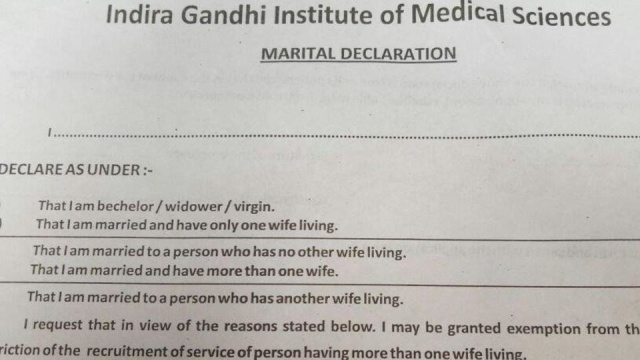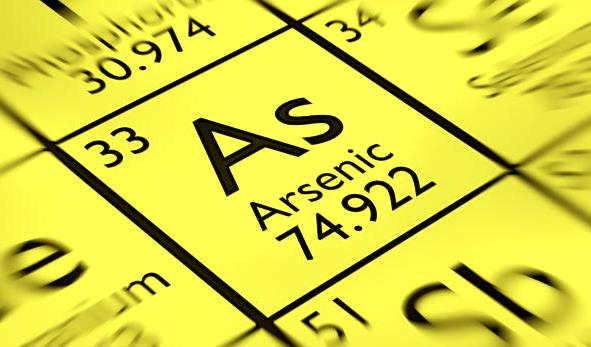Sexuality is not the basis of character and yet the form for appointment in Bihar’s Indira Gandhi Institute of Medical Sciences gives it critical importance. Are we regressing to our feudal past?
Ananya Pathak | Feature Editor | The New Leam
It is a paradox that over the last 34 years, Patna’s well known and premier autonomous health provider, the Indira Gandhi Institute of Medical Sciences (IGIMS), has compelled its employees to make a declaration before joining into its services whether they are virgins or not and it only very recently that the hue and cry over the ‘ridiculous’ question has come into limelight. It is ironic that since the 34 long years since this practice first started nobody ever bothered to raise a voice of protest and today suddenly it has captured the national imagination. After condemnation and much rebuke the authorities at the helm of affairs pinpoint and place the blame on the poor quality translation from Hindi- English of the institute’s marital declaration form.

The form that has remained the same and unchanged since the inception of the institute in 1983, urges the prospective employees/candidates to declare whether they are bachelors, widowers or virgins. Employees here are also required to state if they have more than one wife. What adds to the pathological condition of the state of affairs here is that even the newly appointed health minister was found to be totally unaware of this issue when asked by media personnel.
It is only hilarious that the much unaware and clueless minister told a news channel that the form only required candidates to fill in their zodiac signs and nothing more!
One is only shocked and left wondering when one hears that even the institute’s medical superintendent, Dr Manish Mandal is reported to have said without even once expressing regret or concern that “Our rules and forms are the same as those of the All India Institute of Medical Sciences (AIIMS), New Delhi. We have simply adopted it in letter and spirit.” When questioned about the mandatory virginity declaration, he said, “In Devanagari (Hindi language), unmarried girls are referred to as ‘kunwari kanya’.
The word virgin for it is a case of poor translation. The right word should have been unmarried.” He further added, “Mention of the word virgin on the form has nothing to do with the virginity of an employee. It only seeks to know the marital status of an employee… The IGIMS follows AIIMS, which in turn follows the Central Civil Services (CCS) rules.”
He further stressed upon the point that the employees were required to fill the form at the time of joining the service only so that their dues can be settled on the basis of their declaration in the event of death while in service.
However much in contradiction to the officer’s claims AIIMS said it had no such columns in its recruitment/appointment forms.
In a country characterized by poor and inadequate public infrastructure it is a great irony that despite the social condemnation and protest against this ‘absurd’ requirement Bihar’s top hospital will be unable to do anything to amend the form and correct these objectionable words because it cannot make a change on its own. “The IGIMS cannot change it. If anything has to be amended, it can be done only through legislation or on orders of the judiciary,” said Mandal.
The IGIMS was established based on the model of AIIMS, New Delhi. The main reason for establishing it was so that it could provide super specialty medical facilities to patients in Bihar. Its board of governors has able doctors and officers. It is indeed a tragedy that even in the 21st century we are so deeply enmeshed in our archaic and feudal mindsets. It also seems difficult to believe that despite our aggressive race towards modernization and growing global exchange we as a nation can remain so impoverished in terms of our values, judgments, perceptions and stereotypes. A woman candidate who qualifies based on her own ability and merit is still asked about her sexual trajectory, what for? Years of social movements, feminist upsurges, growth of radical thought in public space and unprecedented global exposure perhaps have yet not been able to free us from the deeply entrenched patriarchal values that we hold so dear. When value-judgments are based on people’s sexual preferences and choices, when their characters are made and assassinated premised on whether they are single/married or working/domesticated it is not difficult to understand why we remain so unprogressive and backward despite all our other achievements.
In the great epic Ramayana, Sita, despite her lifelong loyalty and devotion to her husband lord Rama had to prove her purity to him by undergoing the agneepariksha( fire test) just because she spent years in captivity under the demon king Ravana much in the same way hundreds of women each day in different corners of the country despite their talent, intelligence and brilliance continue to be judged based merely on their sexuality.
Even when they have not committed any sin or injustice it is they who need to constantly prove themselves. It has rightly been said, epics repeat themselves in many ways!
The New Leam has no external source of funding. For retaining its uniqueness, its high quality, its distinctive philosophy we wish to reduce the degree of dependence on corporate funding. We believe that if individuals like you come forward and SUPPORT THIS ENDEAVOR can make the magazine self-reliant in a very innovative way.














